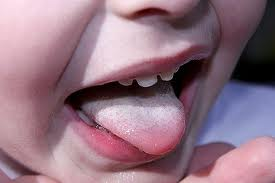 While
some bacteria found in the intestines are good for us (they support the
digestive process and function as our first line defense against
invading pathogens), there are others microbes within us that are
harmful – especially in large numbers. Candida, for example, when
allowed to grow out of control may present itself as Oral Thrush,
causing creamy white lesions in the mouth, usually on the tongue or
inner cheeks, that can be painful. Together, these microorganisms make
up our intestinal flora – or microbiom. Candida is a normal resident in
this microbiom, coexisting in our bodies with many species of bacteria
in a competitive balance. Other bacteria act in part to keep candida
growth in check in our body ecology – unless that balance is upset. When
our immune system is weakened, candida growth can proceed unhindered.
It is an “opportunistic organism,” one which, when given the
opportunity, will attempt to colonize all bodily tissues. The
uncontrolled growth of candida is known as candida overgrowth.
While
some bacteria found in the intestines are good for us (they support the
digestive process and function as our first line defense against
invading pathogens), there are others microbes within us that are
harmful – especially in large numbers. Candida, for example, when
allowed to grow out of control may present itself as Oral Thrush,
causing creamy white lesions in the mouth, usually on the tongue or
inner cheeks, that can be painful. Together, these microorganisms make
up our intestinal flora – or microbiom. Candida is a normal resident in
this microbiom, coexisting in our bodies with many species of bacteria
in a competitive balance. Other bacteria act in part to keep candida
growth in check in our body ecology – unless that balance is upset. When
our immune system is weakened, candida growth can proceed unhindered.
It is an “opportunistic organism,” one which, when given the
opportunity, will attempt to colonize all bodily tissues. The
uncontrolled growth of candida is known as candida overgrowth.Candida Overgrowth Symptoms
Does Your Child Suffer From Candida?
 Some
children just seem to have a constitution that is susceptible to
Candida yeast overgrowth and infections. This may point to an improperly
working digestive system, or an improper diet. These are the children
who have a history with baby thrush, yeasty diaper rash and cradle cap
as babies, and then continue to have skin rashes, weight issues,
attention and concentration challenges, and other yeast problems as they
grow older.
Some
children just seem to have a constitution that is susceptible to
Candida yeast overgrowth and infections. This may point to an improperly
working digestive system, or an improper diet. These are the children
who have a history with baby thrush, yeasty diaper rash and cradle cap
as babies, and then continue to have skin rashes, weight issues,
attention and concentration challenges, and other yeast problems as they
grow older.Candida Overgrowth Causes
The chief culprit responsible for the bloating of our children may not be their lifestyle or food habits – although exercise and eating right is critically important to their health. A primary cause of excess weight might be linked to the over-prescription of antibiotics which kill all bacteria without distinguishing good bacteria from bad. Antibiotics kill the “good” flora which normally keeps the candida under control. This allows for the unchecked growth of candida in the intestinal tract, leading to a wide variety of health issues from fatigue and lethargy, weight gain and bloating, skin rashes and hives, and much more! Meanwhile, with candida being a known pathogen, a child’s immune system becomes overwhelmed trying to keep the overgrowth from consuming the body and eventually weakens to a point where it can’t fight even the smallest infection, virus or cold! The child returns to the doctor, where more antibiotics may be prescribed, and it becomes a vicious cycle.The Over-prescription of Antibiotics
 In
almost all cases, the use of antibiotics should be followed by a
diligent process of restoring the proper intestinal flora to your
child’s body, thus minimizing the potential for a candida overgrowth.
Probiotics, such as ProBio5
manufactured by Plexus Worldwide, can provide relief from candida
overgrowth symptoms and help restore balance to the intestinal flora.
ProBio5 has five extra strength probiotics, added enzymes, intestinal
flora, B6 and Grape Seed extract – all in one effective delivery system
specially formulated to fight candida yeast overgrowth conditions.
Enzymes are essential to the body in its need for support in
synthesizing (breaking down) hostile organisms. Probiotics are used to
restore balance in the intestinal tract thus enabling good bacteria to
flourish and go on to function as our first-line defense against
disease.
In
almost all cases, the use of antibiotics should be followed by a
diligent process of restoring the proper intestinal flora to your
child’s body, thus minimizing the potential for a candida overgrowth.
Probiotics, such as ProBio5
manufactured by Plexus Worldwide, can provide relief from candida
overgrowth symptoms and help restore balance to the intestinal flora.
ProBio5 has five extra strength probiotics, added enzymes, intestinal
flora, B6 and Grape Seed extract – all in one effective delivery system
specially formulated to fight candida yeast overgrowth conditions.
Enzymes are essential to the body in its need for support in
synthesizing (breaking down) hostile organisms. Probiotics are used to
restore balance in the intestinal tract thus enabling good bacteria to
flourish and go on to function as our first-line defense against
disease.[Click here to view a self-test questionnaire...]
If you think your child might be suffering from a candida overgrowth, talk to your pediatrician and consider probiotics to help restore intestinal health. For more information about candida, ProBio5, or other Plexus health products, contact us at info@BeSmartGetHealthy.com.
NOTE: The information presented here is in no way intended as medical advice, diagnosis, or as a substitute for medical counseling. The information should be used in conjunction with the guidance and care of your physician. Your physician should be aware of all medical conditions that you may have, as well as the medications or supplements you may be taking. This information is intended to raise awareness of the threat of candida, and educate consumers in an effort to improve health.